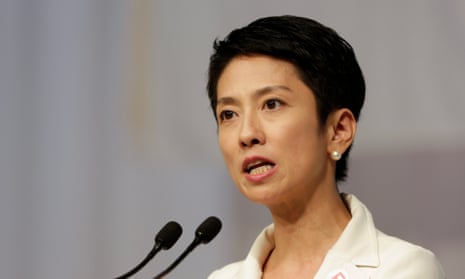A former news anchor has struck a rare blow for Japanese women in public life by becoming the first female leader of the country’s biggest opposition party.
Renho Murata easily defeated her two rivals for the leadership of the left-of-centre Democratic party on Thursday, hours after she sparked a minor controversy by revealing she still held dual Japanese and Taiwanese nationality despite insisting earlier that she had renounced the latter while in her teens.
The 48-year-old, who was born in Japan to a Taiwanese father and Japanese mother, is expected to give her party a temporary boost, following a run of poor election results.
Murata – known simply as Renho – said the party’s priority was to re-establish itself as a serious alternative to the Liberal Democratic party (LDP), which together with its junior coalition partner dominates both houses of parliament.
“From here on, we face a giant ruling party,” she said after the vote. “I’d like to call on everyone to join me in creating a party that does not criticise but makes proposals ... so that one day we will become Japan’s choice.”
Murata is the third woman to attain high political office in Japan in the past two months, although women are still woefully under-represented in the country’s parliament.
In July, Yuriko Koike was elected governor of Tokyo, and immediately confronted the city’s bureaucracy by postponing the relocation of Tsukiji market – the world’s biggest fish market – due to concerns over soil contamination at the new site.
Last month, Tomomi Inada, a rightwinger who has been tipped as a future prime minister, became Japan’s second defence minister.
Their appointments were made against a background of gender imbalance. According to the Inter-Parliamentary Union, women make up less than 10% of MPs in the lower house of Japan’s parliament, and 20% of those in the upper house. Inada is one of only three women in the 20-strong cabinet of the prime minister, Shinzo Abe, whose mission to fill 30% of public and private sector leadership positions with women by 2020 has got off to a disappointing start.
Murata, a former swimsuit model who worked as a journalist before being elected to parliament in 2004, seized the opportunity to lead the Democrats after the former leader, Katsuya Okada, said he was stepping down in the wake of the party’s poor performance in July’s upper house elections.
During its three years in government from 2009, the party was criticised for mishandling the planned relocation of a US marine base on the southern island of Okinawa and for its response to the triple meltdown at Fukushima Daiichi nuclear power plant in March 2011. The party, whose MPs include an uneasy mix of liberal and conservative defectors from other parties, has never recovered from its heavy general election defeat in late 2012.
A poll by the Asahi Shimbun this week showed support for the LDP at 40%, with the Democrats on just 7%.
Murata’s attempts to rebuild the party’s credibility got off to a shaky start, just hours before her expected victory was confirmed on Thursday.
Questioned by reporters, she acknowledged that she still held Taiwanese nationality, despite earlier claiming that she had become a naturalised citizen of Japan in 1985 at the age of 17.
“I would like to apologise for the confusion caused by my inaccurate recollection of what happened and the contradictions in my recent remarks,” she said, before confirming that she identified herself as Japanese. “I’ve always worked for the good of this, my own country, and I’ll continue to do so,” she said.
Japanese law requires people with dual nationality to choose one or the other before they reach the age of 22, although failure to do so is not a crime. Many retain dual nationality under a “don’t ask, don’t tell” policy.
The nationality debacle is likely to be seized on by her opponents, however. The conservative Yomiuri Shimbun newspaper described Murata’s confusion over her nationality as a “sorry state of affairs”.
Despite her assurances this week that she had taken steps to renounce her Taiwanese citizenship, the newspaper said in an editorial: “It is out of the question for a legislator – who is supposed to serve the interests of the nation, including in foreign affairs and national security – to leave their own nationality obscure.”
The Yomiuri suggested that some might question her loyalty to Japan, particularly over foreign policy issues where it is in disagreement with Taiwan.
“Although Taiwan is friendly towards Japan, it is in conflict with the Japanese standpoint regarding some issues, for instance, its ownership claims on the Senkaku islands,” the paper said. “If Renho retains her Taiwan citizenship, she could become the target of undesirable suspicions regarding her relations with Taiwan.”
The Senkakus are administered by Japan but also claimed by China and Taiwan.
During her leadership campaign, Murata vowed to protect the war-renouncing article of Japan’s postwar constitution, as speculation mounts that Abe will use his party’s big parliamentary majority to trigger changes that would end the military’s strictly defensive role.
